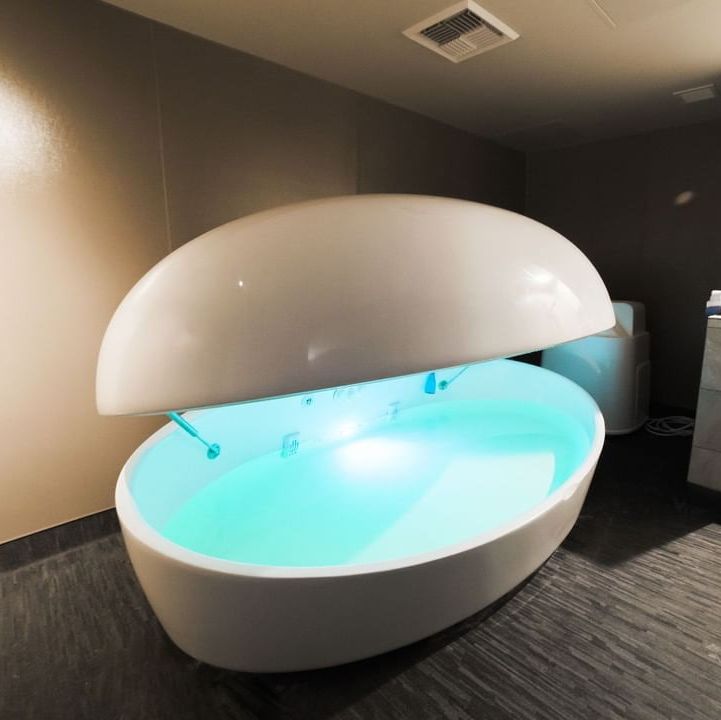Flotation Therapy For a Multitude of Body and Mental Health Benefits
"It calms the mind, sharpens our sense of the body and helps us live in the moment -- all of which can break the cycle of negative thoughts.""Floating might shift attention away from how the body looks to how it feels, promoting a healthier body image."Sahib Khalsa, principal investigator, clinical director, Laureate Institute for Brain Research, Tulsa"Is there something special about flotation, or not?"Maybe you're just in a very relaxing environment, so how unique is it compared to other relaxation techniques we have?"Wen Chen, National Institutes of Health, branch chief, basic and mechanistic research, complementary and integrative health"Floating has been referred to as 'sensory deprivation', which I think is a misnomer.""[On the contrary, patients have reported] enhancement [of internal sensations during flotation, such as noticing their breath and heartbeat]."Justin Feinstein, director, president, Float Research Collective
:max_bytes(150000):strip_icc():format(webp)/Float-Therapy-dc428b3988124ef38a14c442b685630d.jpg) |
| Group4 Studio / Getty Images |
Basically, flotation therapy, recently popularized as a relaxation technique that can lead to improved mental health, involves floating in a tank of warm-salt-saturated water. A growing body of research appears to validate the belief the therapy may reduce symptoms of mental health conditions. Float tank sessions take about an hour with a typical experience seeing people enter the pod that looks like an oversized hot tub that is filled with shallow body-temperature water saturated with Epsom salts to buoy the body.
The pod can be left open, alternatively the lid closed to give the impression of being cocooned where light and sound is shut out. According to experts in the field, float therapy appears to operate on several levels to heighten the senses, help in relaxation, leading to the body and mind feeling soothed. "It's become like a ritual. You unwind, and you begin to see life differently, from a more distanced perspective", explained 27-year-old Abby Michel, for whom floating on a regular basis has become "an important tool in the tool box", in the management of her anxiety.
There are studies indicating that float therapy may reduce symptoms of a number of conditions, including generalized anxiety disorder, depression and anxiety. Lowering blood pressure is another benefit of the therapy along with a decrease in muscular soreness following high-intensity exercise. As well, according to preliminary research, the therapy may serve to minimize cravings of addiction-related illnesses.
Brain and time perception researcher Marc Wittmann, based in Freiberg, Germany, views the experience as being akin to meditation. "During meditation, you feel that you lose your body boundaries and you are more one with the environment", he explained of his experience with the use of float tanks for his research. The dissolving sense of one's body is correlated, he states, with lower anxiety, according to his own research.Evidently the therapy has properties that are able to enhance a biological process called "interoception", defined as the process by which the nervous system "senses, interprets and integrates" signals from the body.
Some researchers study whether flotation therapy can be of assistance to people with eating disorders; an NIH-funded study, recruiting patients at present, is set to investigate how augmenting float therapy with interoception-focused psychotherapy can improve anxiety and body image in patients suffering from anorexia nervosa. A randomized controlled trial of 68 women and girls hospitalized for anorexia led researchers to report twice-weekly float sessions improved patients' levels of body dissatisfaction.
According to one estimate, growing consumer demand has led to the opening of nearly 400 float centres in the United States, an increase from 50 in 2010, with costs from $50 to $100 each 60- or 90-minute session. With the newer float centres, people can look forward to accompanying calming music and soft lighting as well as less claustrophobic pools, more related to open-style hot tubs. The therapy offers profound relief for some individuals.
 |
| Float Seattle |
"The float tank helped me to take a break from the real world, a break from my body for a little bit.""Before, I'd hear the eating disorder voice, the diet commercial voice, the influencer who lost weight voice, the dad trauma voice.""In the float tank, I could hear my own voice."Emily Noran, 28, San Diego
Labels: Eating Disorders, Float Therapy, Mental Health, Mitigation of Body Aches, Therapeutic Alternatives

0 Comments:
Post a Comment
<< Home